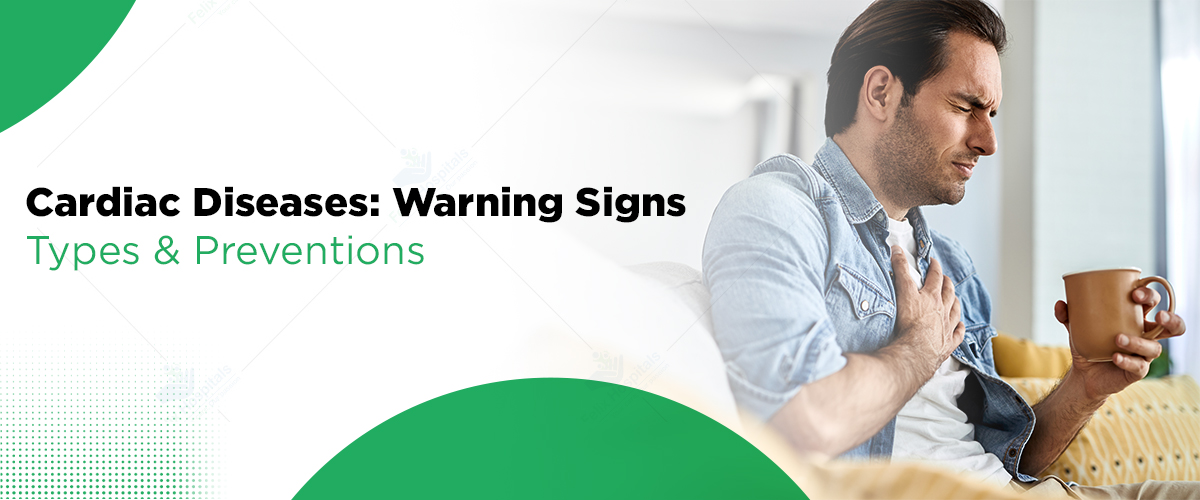
Subscribe to our

Heart disease continues to be the most common cause of death worldwide, killing millions of people annually. However, most cardiac ailments can be avoided or effectively controlled with early detection and proper interventions with the assistance of the best heart hospitals in Noida. Identifying the warning signs, identifying the categories of heart diseases, and applying preventive measures are measures towards maintaining your cardiovascular health.
Don’t wait for symptoms to worsen. Early detection saves lives. Call us at +91 9667064100 or book your consultation online with our cardiology team today.
Cardiac disease, or heart disease, is a general term for a wide range of disorders of the structure and function of the heart, keeping it from functioning normally. Some examples are coronary artery disease (when arteries supplying the heart become narrowed or blocked), heart failure (when the heart is unable to pump effectively), arrhythmias (abnormal heart rhythms), valvular heart disease (disease of the heart valves), cardiomyopathy (heart muscle disease), and congenital heart defects (existing at birth).
Cardiac illnesses include a wide range of illnesses that involve heart structure and function:
The heart typically gives warning signs prior to a big heart attack. Early knowledge of these warning signs could be the key to survival:
Women will have different or unexpected symptoms from men, such as fatigue without a reason, insomnia, shortness of breath, nervousness, and pain in the back, jaw, or throat instead of the usual chest pain. If you are experiencing any problem, simply ring the top cardiac issues treatment hospital. We are here for you.
Most heart ailments can be avoided through lifestyle change and risk factor control:
Timely and professional treatment is necessary when it comes to the treatment of cardiac conditions—high blood pressure, chest pain, arrhythmias, or long-term heart disease. At Felix Hospital, some of the best cardiologists in Noida provide personalized, holistic treatment regimens to address various heart diseases and ensure overall heart health.
Meet Our Experienced Cardiologists:
These seasoned heart doctors are committed to early detection, optimal medical treatment, and prevention of a range of cardiac ailments. Leveraging the latest state-of-the-art facility and patient-focused care, Felix Hospital delivers the ultimate standard of cardiac care at its most critical.
If you have concerns about your heart health or need information about treatment options, cost estimates, or choosing the right cardiologist, schedule your consultation today.
Remember that heart attacks do not always present the same way with everyone. In doubt, it is always better to rush to see a physician – minutes matter when dealing with cardiac events.
By paying attention to warning signs, understanding various forms of heart conditions, and following preventive guidelines, you can actually lower your risk of having cardiac disease and enhance the quality of life to a considerable extent. Taking care of your heart is a life-long endeavor that starts with knowledge and goes on with regular, heart-friendly decisions every day. So simply give us a call for your more questions regarding the cost of the treatment, the cardiologist, or the hospitals. We are always there to guide you.
1. When do I need to see a cardiologist despite the fact that I am not having chest pain?
Ans- You need to visit a cardiologist if you come in with symptoms such as fatigue, shortness of breath, puffiness, or arrhythmias—without pain. Being high-risk by family history, as well as elevated cholesterol levels, are good reasons for a visit.
2. Can heart disease be treated by modifying lifestyles?
Ans- Though structural damage can never be reversed entirely, the addition of a healthy way of life will go a long way in making the heart function more effectively and preventing disease progression. Timely diagnosis is the solution.
3. What are Felix Hospital's diagnostic tests available for diagnosing heart disease?
Ans- We have ECG, Echocardiography, TMT (Stress Test), Holter Monitoring, Cardiac MRI, and sophisticated blood tests to monitor your heart condition.
4. Why do I suspect my symptoms are cardiac and not anxiety or acidity?
Ans- Symptoms of the heart are typically with exertion and relieved by rest. If unsure, have a prompt medical evaluation—particularly for chest pain, pain radiating, or shortness of breath.
5. Is heart disease prevalent in young adults?
Ans- Yes. Through stress, physical inactivity, and diet, cardiac illness is increasingly becoming a feature of people in their 20s and 30s. Screening should be done at an early age too.
6. Why is sleep significant in heart health?
Ans- Sleep disturbances and sleep disorders such as sleep apnea are associated with high blood pressure, stroke, and heart failure. Good quality sleep is important for cardiovascular well-being.
7. Is Felix Hospital equipped with emergency cardiac care?
Ans- Yes. Our emergency room is fully staffed 24/7 to handle heart attacks, life-threatening arrhythmias, and other cardiac emergencies with immediate interventions.